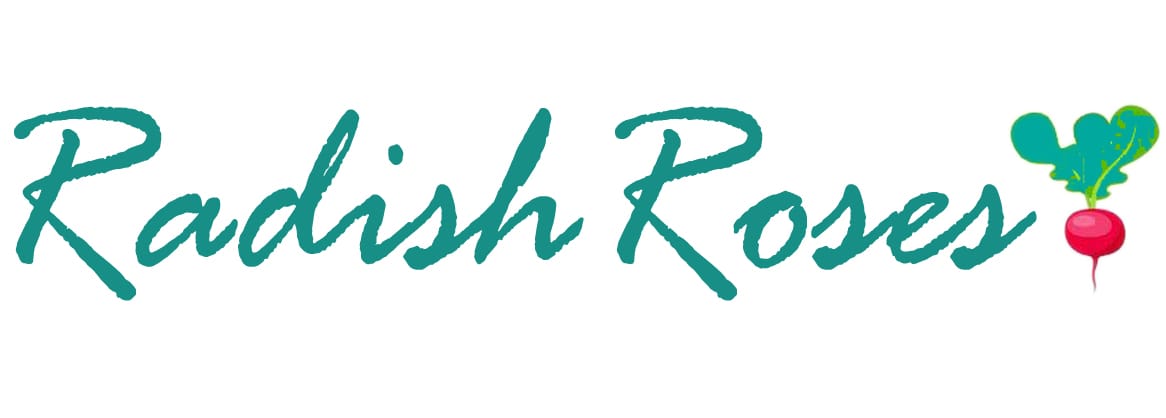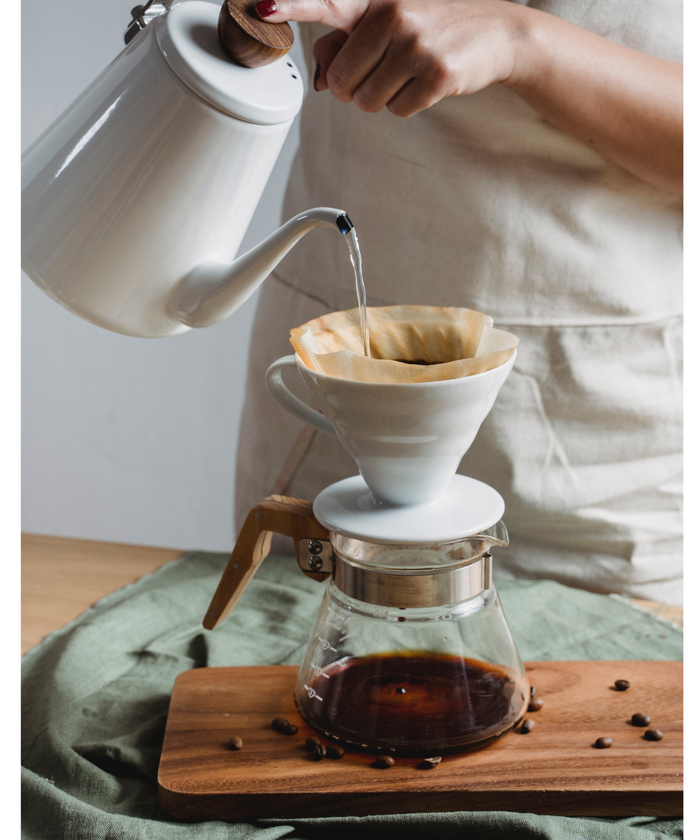Are you ready to embark on a journey to find the perfect coffee beans for your pour-over brewing ritual? Discover the best coffee for pour over, the factors that affect the taste and quality of pour-over coffee, and practical tips to elevate your morning cup. Let’s dive into the world of pour-over coffee and uncover its secrets.
Key Takeaways
- This article provides an overview of the top five coffee beans for pour-over brewing, as well as factors to consider when choosing and tips on how to brew.
- The roast level of coffee beans directly affects flavor profile, while exploring bean origins can lead to unique experiences with complex flavors.
- Supporting sustainable and ethical brands allows one to enjoy delicious coffee with a responsible approach.
Top Coffee Beans for Pour Over Brewing
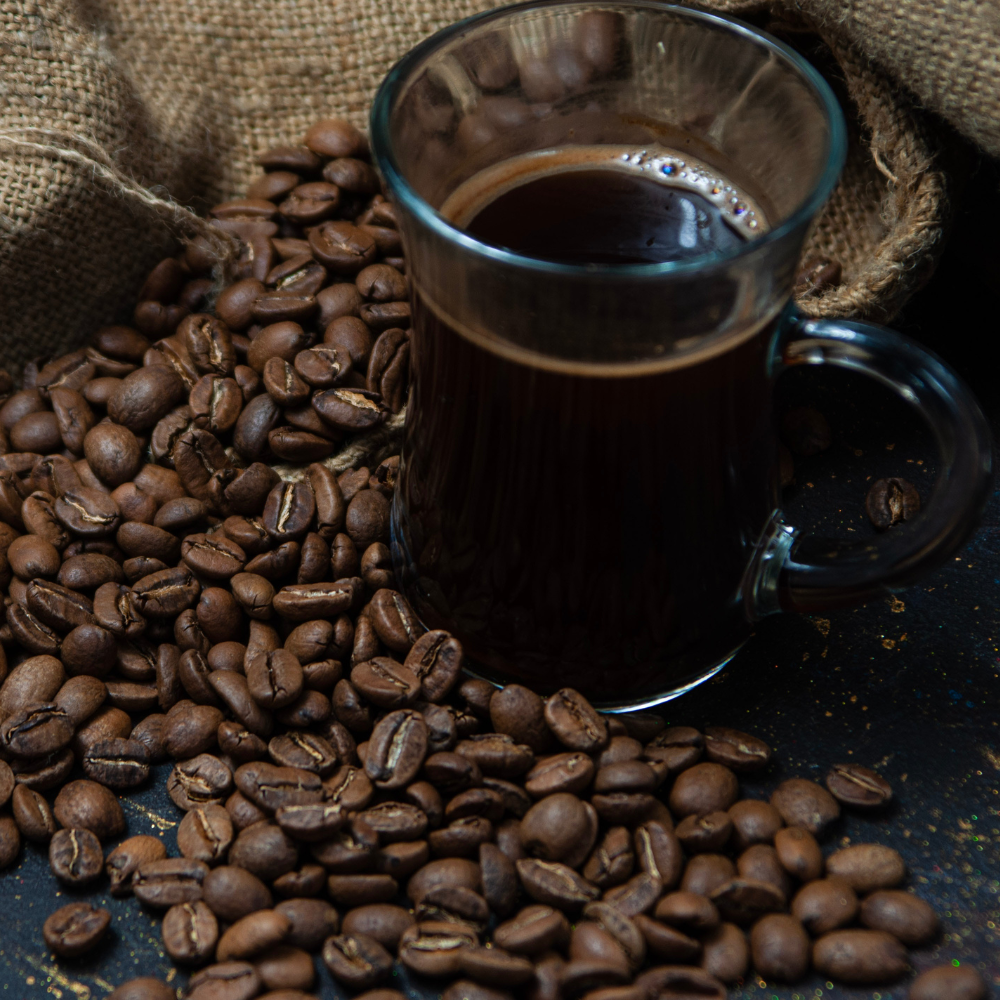
The selection of the best coffee beans for pour-over brewing can be an exhilarating journey, especially when you’re aware of what to search for, especially for coffee lovers.
Typically, light and medium roasted coffee beans are best for the pour over brewing method.
Discover our five highly recommended coffee beans that cater to diverse taste preferences, encapsulating the spirit of pour-over brewing and delivering an unforgettable coffee experience.
Lightly Roasted Delight: Ethiopian Yirgacheffe
Ethiopian Yirgacheffe coffee beans are a popular choice among pour-over enthusiasts who appreciate a bright and intricate cup. These beans offer a delightful balance of fruity and floral nuances, with subtle hints of lemon and honey. Perfect for those who enjoy a vibrant and complex cup, Ethiopian Yirgacheffe is a testament to the rich coffee heritage of Ethiopia.
Packaged using a nitrogen flush, the Ethiopian Yirgacheffe lightly roasted coffee beans reach coffee drinkers in their freshest state. The light roast allows the beans to shine in the pour-over method, resulting in a smooth and bright cup that will energize your early mornings.
Medium Roast Marvel: Kauai Coffee Estate Reserve Peaberry
According to their website, "sweet, bright flavors that tease of citrus. Here is a coffee brimming with tropical sunshine." Sweet fragrance with hints of lemon, making it a perfect companion to breakfast foods and versatile enough for various brewing methods.
The bright flavors and lower acidity makes it a favorite for morning cups, preferably alongside a hearty breakfast. Whether you enjoy pour-over, French press, or Moka Pot, this medium roast marvel adapts to your brewing method of choice, ensuring a delicious start to your day.
Kauai Coffee is sutainably grown and GMO-free. Their single origin Estate Reserve offers several varieties that would be delicious when brewed using the pour-over method.
Organic Excellence: Coffee Bros Light Roast Signature Blend
Welcome to the realm of organic coffee with Coffee Bros Light Roast Signature Blend. This certified organic blend of Arabica beans features a fruity and sweet flavor profile, making it an ideal choice for pour-over brewing methods.
Coffee Bros Light Roast Signature Blend:
- Delicious and versatile
- Reasonably priced
- Offers great value to coffee enthusiasts
- Organic and supports sustainable farming practices
- Delivers a delightful coffee experience
Factors to Consider When Choosing Pour Over Coffee Beans
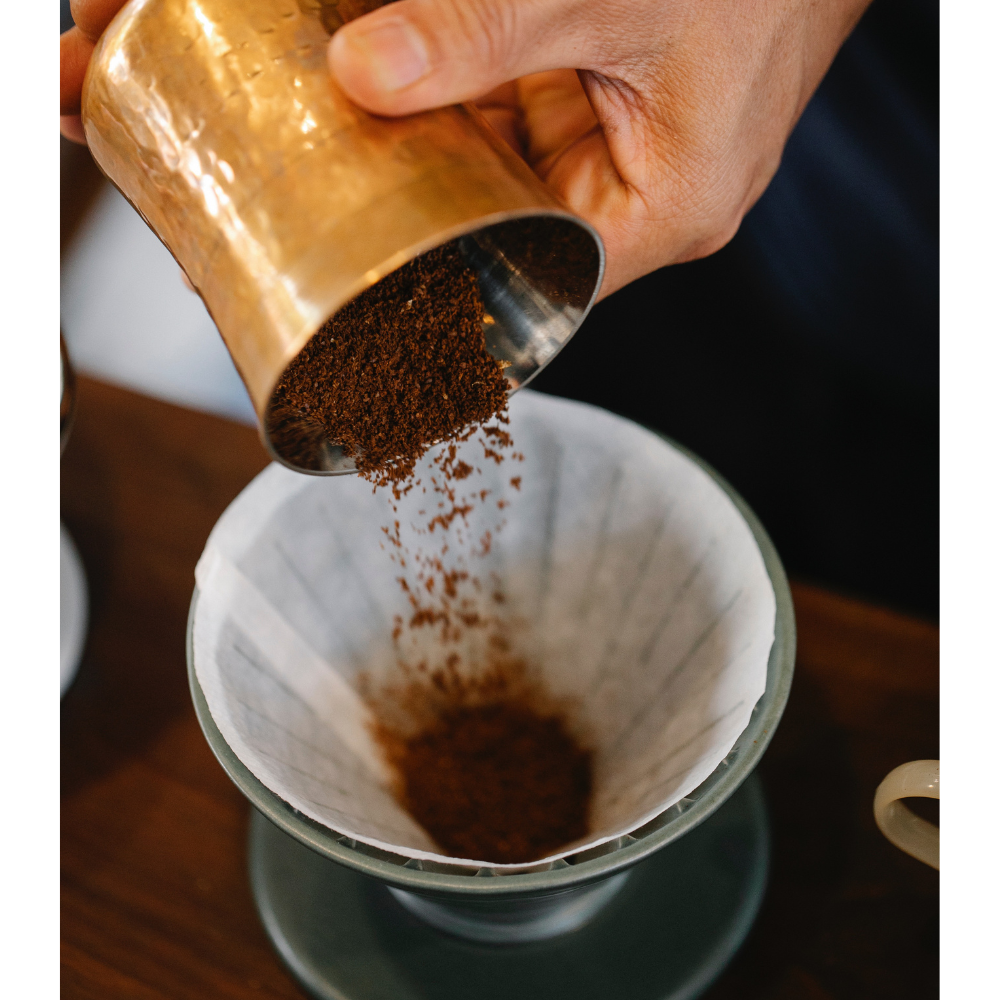
While delving into the realm of pour-over coffee beans, it’s vital to take into account key elements that impact their taste and quality. In the following sections, we’ll discuss how the following factors affect your pour-over experience and guide you in selecting the perfect beans for your brewing journey.
- Roast level
- Bean origin
- Freshness
- Grind size
Roast Level and Flavor Profile
The roast level significantly influences the flavor profile of coffee beans. Light roast and medium roast coffee beans typically exhibit a brighter, more acidic taste, highlighting sweet, fruity, tangy, or floral notes. On the other hand, a dark roast tends to have a more robust and bitter flavor, often featuring caramel and milk chocolate notes. Dark roast coffee is not as commonly used as medium roasts and light roast coffee. Whether you enjoy the fruity flavors of light roasts or the rich cocoa notes of dark roasts, your pour-over experience will be greatly enhanced by choosing beans that align with your taste preferences.
Bean Origin and Taste Characteristics
The flavor of a coffee bean can be significantly influenced by its geographic origin, with various regions yielding coffee beans with unique coffee taste traits. Ethiopian beans are known for fruity and floral notes, while Colombian beans often exhibit a balanced mix of sweetness and acidity. Pacific varieties, including the volcanic soil-grown Kona beans and Kauai Coffee of Hawaii are known by coffee lovers for their lower acidity, revealing their bright citrus and/or smoky flavors.
By exploring the flavors of coffee beans from various regions, you can refine your pour-over preferences and discover new taste sensations. Experimenting with single-origin beans or blends that combine beans from different regions can lead to exciting and unique pour-over experiences.
Freshness and Whole Bean Coffee
When it pertains to pour-over coffee, freshness holds utmost importance. Using freshly roasted and ground coffee beans ensures maximum flavor and aroma in your brewed coffee. As pre-ground coffee rapidly loses freshness and flavor, it’s best to buy whole bean coffee and grind it yourself just before brewing.
Investing in a quality burr coffee grinder and storing your beans in airtight containers can help maintain their freshness, ensuring that each pour-over brew is as delicious as possible. Remember, the best coffee beans to use are freshly roasted beans that you have ground just before brewing.
Ideal Grind Size for Pour Over Brewing
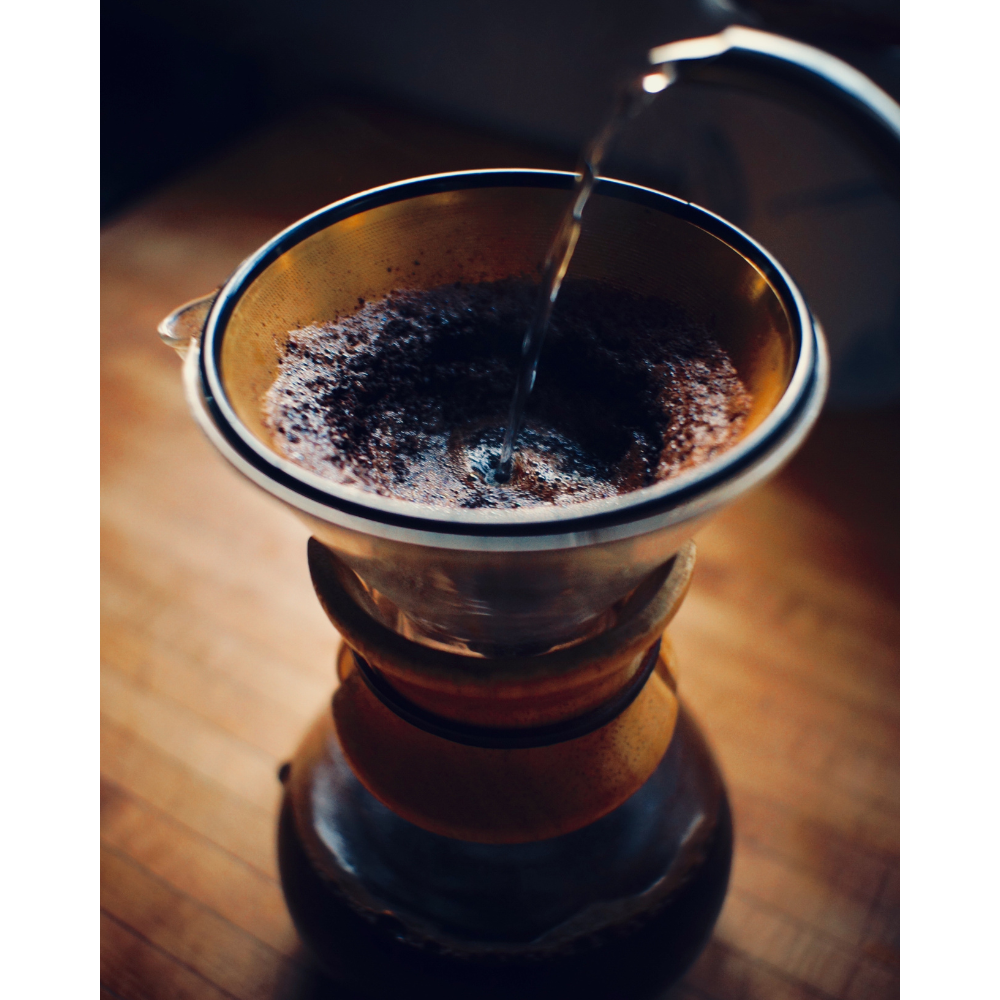
The grind size of your coffee beans significantly affects the pour-over brewing process. A medium-fine grind size is recommended for even extraction and a clean taste in pour-over coffee.
If you find your pour-over coffee too watery, try using a finer grind size to achieve a more concentrated flavor. By experimenting with different grind sizes, you can fine-tune your pour-over brewing process and achieve the optimal balance of flavor and extraction.
Remember, the perfect grind size can make all the difference in your pour-over coffee experience.
Pour Over Coffee Brewing Tips
To brew the perfect pour-over coffee, it’s important to heed a few practical brewing guidelines. First, ensure that you use the correct coffee-to-water ratio, typically around 1:15, with 15 grams of water for every 1 gram of coffee grounds.
Next, pay attention to the water temperature, aiming for a range of 195-205°F (90-96°C). You want to dampen your grounds evenly and allow to soak for 30 seconds to one minute. This process is called allowing the coffee grounds to "bloom" before pouring the water. Letting your grounds bloom will avoid channeling, and allow for even and full extraction.
Be mindful of your brewing time, which can vary depending on your pour-over coffee maker and grind size. A brewing time of 3-5 minutes is optimal for extracting the best flavors from your coffee grounds.
By following these tips, you’ll be well on your way to perfecting your pour-over brewing technique and enjoying an exceptional cup of brewing coffee.
Best Pour Over Coffee Makers
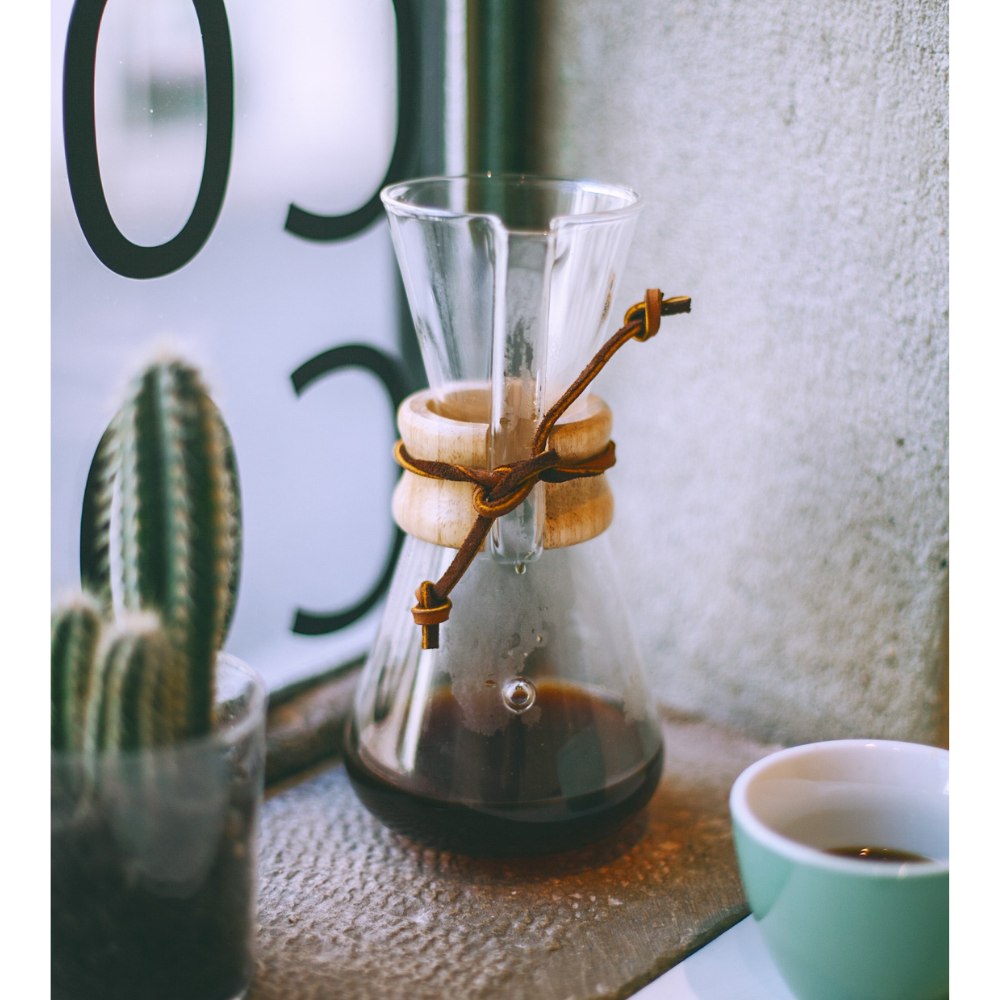
As you immerse yourself in the realm of pour-over brewing, you might be curious about the top coffee makers to uplift your experience.
Popular pour-over coffee makers such as the Hario V60, Chemex, and Kalita Wave offer unique features and benefits for pour-over enthusiasts.
The Hario V60 features a cone-shaped design with spiral ribs and a large hole for even extraction, while the Chemex boasts an elegant hourglass shape and wooden collar for easy handling. The Kalita Wave, on the other hand, offers a flat-bottomed design with three holes for consistent brewing results.
By exploring these pour-over coffee makers, you can find the perfect match for your brewing preferences.
Sustainable and Ethical Coffee Brands
In the contemporary world, numerous coffee drinkers gravitate towards brands that give precedence to sustainability and ethical practices. By choosing coffee beans from brands that support fair trade certification, organic farming, and local communities, you can enjoy your pour-over coffee with a clear conscience.
Shade-grown and ethical varieties promote humane working conditions. Fair Trade helps ensure exported coffee is purchased at competetive prices, supporting fair compensation for workers. There are many brands that promote these practices these days. Look for the Fair Trade Certified and Sustainably sourced labeling.
By supporting sustainable and ethical brands, you not only treat yourself to delicious coffee, but also contribute to a more sustainable and ethical coffee industry.
Summary
In conclusion, discovering the best beans for pour-over brewing coffee and understanding the factors that affect their taste and quality is an enriching experience. By considering roast level, bean origin, freshness, and grind size, you can elevate your pour-over brewing and create a perfect base for many coffee recipes. Embrace the world of pour-over coffee and let it transform your mornings one cup at a time.
Frequently Asked Questions
What coffee roast is best for pour over coffee brewing?
a: For making pour over, light and medium roasts are generally preferred, as they offer a bright and acidic flavor profile with multifaceted notes and aromas.
Light roasts provide a brighter, more acidic taste, while dark roasts tend to have a more robust and bitter flavor - making the roast level key in determining the flavor profile of coffee beans.
The roast level of coffee beans can have a significant impact on the flavor profile of the coffee. Light roasts provide a brighter, more acidic taste, while dark roasts tend to have a more robust and bitter flavor. This makes the roast level key in determining the flavor profile of coffee.
Experiment until you find what works best for your taste.
What kind of grind is best for pour over coffee?
a: For the best pour-over experience, medium-coarse to medium-grind coffee is the best grind size.
This will provide an optimal amount of flavor extraction without risking over-extraction. If you are using a cone-shaped pour over, then use a medium-fine coffee grind instead.
How can you identify ethically sourced coffee?
a: Identifying ethically sourced coffee can seem like a daunting task given the vast array of coffee brands available on the market.
However, there are several indicators that can help you discern whether a brand prioritizes ethical sourcing practices.
Fair Trade Certified, for instance, guarantees that farmers are paid a fair price for their produce, promoting better working conditions and prohibiting child labor. Rainforest Alliance Certified, on the other hand, focuses on environmental sustainability, protecting biodiversity and promoting the well-being of workers and local communities. The USDA Organic label ensures that the coffee has been grown without the use of synthetic pesticides and fertilizers.
By taking these factors into account, you can make an informed decision and enjoy your pour-over coffee knowing that it's been ethically sourced.
What coffee brand is the most ethical?
a: In the world of coffee, there are several brands that stand out for their commitment to ethical sourcing and sustainability.
There are a great many brands that prioritize fair trade practices, organic farming, and support of local communities, making them top choices for conscious coffee drinkers. Here are a few suggestions:
- Equal Exchange - This worker-owned cooperative has been a leading voice in the fair trade movement since 1986. They source their coffee directly from small-scale farmers, ensuring fair prices and sustainable practices.
- Counter Culture - Committed to sustainability and transparency, Counter Culture publishes an annual report detailing their sourcing practices and environmental impact. They also offer extensive resources on home brewing and coffee education.
- Dean's Beans - This brand focuses on social, economic, and environmental development in coffee-growing communities. They work directly with farmers and local communities to implement projects such as reforestation, women's health initiatives, and clean water access.
- Kickapoo Coffee - This Wisconsin-based roaster sources coffee from around the world, with a focus on fair trade and organic beans. They're also a member of Cooperative Coffees, a group of roasters committed to fair and direct trade.
- Larry's Coffee - Larry's Coffee is dedicated to blending and roasting innovative, sustainable coffee. All their beans are fair trade, shade-grown, and organic, and they use compostable packaging for their products.
By choosing to buy from these ethical coffee brands, you can enjoy a delicious cup of pour-over coffee while also supporting sustainable and fair practices in the coffee industry.
What is the best coffee-to-water ratio for pour-over brewing?
